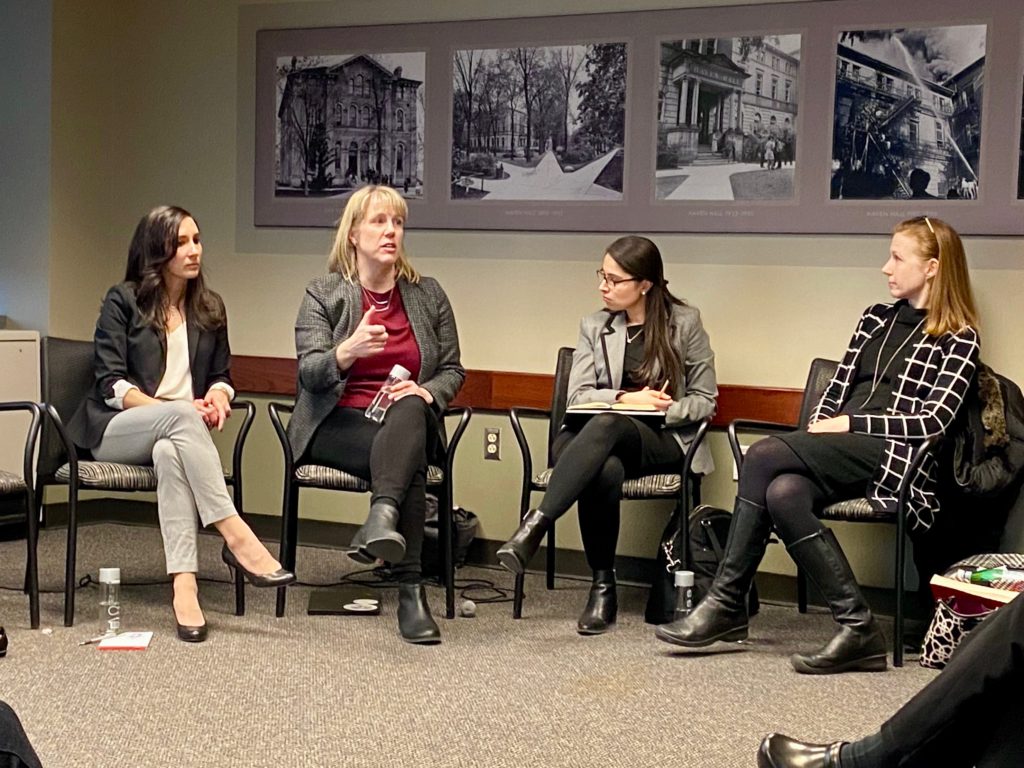Mar 5, 2020 | Uncategorized
Post developed by Kelly Askew and Katherine Pearson
 Maasai Remix, a documentary directed by the award-winning team of filmmaker Ron Mulvihill and anthropologist Kelly Askew, follows three Maasai individuals who confront challenges to their community by drawing strength from local traditions, modifying them when necessary, and melding them with new resources.
Maasai Remix, a documentary directed by the award-winning team of filmmaker Ron Mulvihill and anthropologist Kelly Askew, follows three Maasai individuals who confront challenges to their community by drawing strength from local traditions, modifying them when necessary, and melding them with new resources.
The three subjects of this documentary live in different settings. Adam Mwarabu advocates for Maasai pastoralists’ rights to land in international political spheres. Evalyne Leng’arwa pursues a college education in the U.S., having convinced her father to return 12 cows to a man contracted to marry her. Frank Kaipai, the village chairman, faces opposition as he promotes secondary school education and tries to save the village forest. Sharing a goal of Maasai self-determination in an ever-changing world, Adam, Evalyne, and Frank innovate while maintaining an abiding respect and love for their culture.
In a companion film produced by Kelly Askew entitled The Chairman and the Lions, the focus was on the many challenges faced by Parakuyo Maasai, including marauding lions, landgrabbers, illegal loggers, male youth out-migration and lack of education. By contrast, the message of Maasai Remix is one of hope and innovation, and of connected yet individual initiatives in addressing communal challenges. It champions the use of tradition as a mode of community development and as such offers a rebuttal to the widespread view that culture is always and only an obstacle to development initiatives. Quite the contrary, Adam, Evalyne and Frank illustrate through word and deed how traditions can be deployed as tools of empowerment. Thus, integrating their culture with modernist goals in a manner, not unlike the remixes of hip-hop DJs, Maasai Remix celebrates the achievements of these individuals and the lifeways of their community.
Mar 3, 2020 | Current Events, Elections, Gender, National, Policy, Race, Social Policy
Post developed by Katherine Pearson
A panel of prominent political scientists presented their research at the panel “One Hundred Years of Women Voting: The Nineteenth Amendment’s Legacy and Current Implications” on Monday, February 24, 2020. The experts discussed the political behavior of women leading up to and since the passage of the Nineteenth Amendment to the U.S. Constitution, which granted women the right to vote. Jenna Bednar, professor of political science at the University of Michigan and research faculty at the Center for Political Studies, moderated the discussion. The event was part of the U-M Department of Political Science Rubin Speaker Series and U-M Suffrage 2020 event series.

Mara Ostfeld, Christina Wolbrecht, Angela Ocampo, and Corrine McConnaughy
Popular views of women voters over the past 100 years, and what the evidence actually tells us about them
In her newly-released book, A Century of Votes for Women: American Elections Since Suffrage, Christina Wolbrecht, professor of political science at the University of Notre Dame, presents evidence to challenge some of the long-standing beliefs about the way women vote and engage in politics.
In the first several decades of women’s suffrage in the U.S., understanding of women’s political behavior was based on rhetoric, not based on data, said Wolbrecht. Data does show that married women often voted as their husbands did. Political experts interpreted this correlation as evidence of political disinterest on the part of women, but this conclusion was not based on data. Following the belief that women didn’t form independent political opinions, Gallup used quota controlled sampling that undersampled women. The American Voter describes women as following their husband’s wishes rather than voting according to their own beliefs.
Wolbrecht argues that these unsupported conclusions still matter today because these books are still read today. She emphasizes that although married women often vote as their husbands do, we don’t know who is influencing whom.
Political Pioneers: Women of Color as Candidates and Elected Officials
Angela X. Ocampo, a research fellow in the department of political science and the Center for Political Studies, presented current research assessing the representation of women of color as political candidates and elected officials. “Women don’t get access to vote until their racial group does,” said Ocampo, noting that women of color were still denied the right to vote or hold elected office on the basis of race after the passage of the Nineteenth Amendment.
Most research on women of color in elected office focuses on the federal level, but Ocampo, along with her research collaborator, Ana Oaxaca, is studying representation in local government. Their research shows that women are most likely to be elected from places that are protected by the Voting Rights Act. Following the Supreme Court’s decision in Shelby County v. Holder, which significantly weakened the Voting Rights Act, Ocampo sought to understand how the representation of women of color was affected at the local level.
To answer this, she’s analyzing data on city councils in the 300 largest U.S. cities to isolate the factors that are associated with a high proportion of women of color council members. Women of color are underrepresented in city councils, making up only 10% of council members. Ocampo finds that the more Democratic a locality is, the higher the proportion of women of color and minority council members. Proxies of political power are also important. When there is a higher proportion of more minority voters in a city, the proportion of women of color and minority council members also increases.
Ocampo concludes that gains have been made in representation, but parity is yet to be achieved. Representation of women of color and minorities depends on political pressures and the voting power of minority voters. She cautions that upward trends in the representation of women of color and minorities will likely be derailed by efforts to suppress minority votes.
Hidden Politics: Women’s Organizing and the Shape of American Democracy
Corrine McConnaughy is an Associate Professor of Political Science at George Washington University. She earned her Ph.D. at the University of Michigan and worked closely with many of the faculty during that time.
McConnaughy said that to find examples of women doing political work in the period before suffrage, we must look beyond formal suffrage organizations. Whether political organizing was taking place within suffrage organizations or other organizations, historians find common themes in women’s political activity in the period before the nineteenth amendment. Women were doing crucial service work in their communities and creating innovative ways to gain power. Importantly, women were doing political work as women, but not unified by womanhood.
The suffrage movement faced challenges because women were not seen as a promising voting bloc, McConnaughy said. Because so many people believed women would vote as their husbands did, no party stood to gain an advantage by allowing women to vote. For this reason, bi-partisan support was essential to gaining franchise. The ability to form coalitions with other groups also proved essential. Suffragists were well-organized and good at raising money, which made them attractive coalition partners.
Why Women Oppose Policies that Support Women
The final speaker was Mara Ostfeld, is a Faculty Associate with the Center for Political Studies and an Assistant Professor in the Department of Political Science. She presented research she is conducting with two graduate students, Lauren Hahn and Sara Morell.
Ostfeld framed their question: “In the 100 years that women have had access to voting rights, and in the context of women constituting the majority of voters in America, why hasn’t there been more progress for policies to provide women with equitable opportunities?” She cited statistics to illustrate the issue: 20% of women say that reports of the gender pay gap are overblown; one-third of women say that women who complain about sexual harassment create more problems than they solve; another third believe that at least half of the time that women demand equality, they’re actually seeking special favors.
Family socialization is the key reason for these beliefs, according to Ostfeld. “Unlike other marginalized groups, women are not raised in women-majority environments,” she noted.
Ostfeld, Morell, and Hahn conducted a survey to gauge how women believe their family members would react to taking pro-women positions, to assess how women perceive the social costs of their beliefs within their families. The survey also asked about the polices the women supported. Ostfeld found clear evidence that women who believed they will be stigmatized for embracing policies to promote gender equality are far less likely to support those policies. Even among women respondents who recognized the gendered disparities motivating the policies, they were still less likely to support policies promoting gender equality if they felt their family members would stigmatize them for doing so.
 Maasai Remix, a documentary directed by the award-winning team of filmmaker Ron Mulvihill and anthropologist Kelly Askew, follows three Maasai individuals who confront challenges to their community by drawing strength from local traditions, modifying them when necessary, and melding them with new resources.
Maasai Remix, a documentary directed by the award-winning team of filmmaker Ron Mulvihill and anthropologist Kelly Askew, follows three Maasai individuals who confront challenges to their community by drawing strength from local traditions, modifying them when necessary, and melding them with new resources. 

